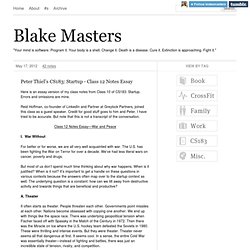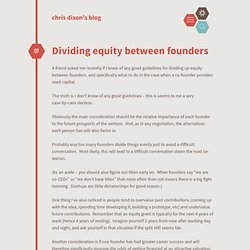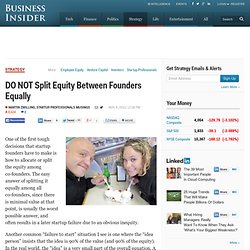

Class 12 Notes Essay. Peter Thiel’s CS183: Startup - Class 12 Notes Essay Here is an essay version of my class notes from Class 10 of CS183: Startup.

Errors and omissions are mine. Reid Hoffman, co-founder of LinkedIn and Partner at Greylock Partners, joined this class as a guest speaker. Credit for good stuff goes to him and Peter. I have tried to be accurate. Class 12 Notes Essay—War and Peace I. For better or for worse, we are all very well acquainted with war. But most of us don’t spend much time thinking about why war happens. A. It often starts as theater. There are ways in which competition and war are powerfully motivational. So war can be a very powerful, motivational force. B. But the Charles Atlas example illustrates more than just the motivational aspect of war. This is the psychological counterpoint to the economic discussion we had in classes three and four.
C. There are two competing paradigms one might use to think about conflict. E145-1-2a copy.mov. Chris Dixon. Dividing equity between founders. A friend asked me recently if I knew of any good guidelines for dividing up equity between founders, and specifically what to do in the case when a co-founder provides seed capital.

The truth is I don’t know of any great guidelines – this is seems to me a very case-by-case decison. Obviously the main consideration should be the relative importance of each founder to the future prospects of the venture. And, as in any negotiation, the alternatives each person has will also factor in. Probably way too many founders divide things evenly just to avoid a difficult conversation. Most likely, this will lead to a difficult conversation down the road (or worse). (As an aside – you should also figure out titles early on. One thing I’ve also noticed is people tend to overvalue past contributions (coming up with the idea, spending time developing it, building a prototype, etc) and undervalue future contributions.
Startup Founder Equity Split. Founders frequently ask me to provide guidance on how their startup should split equity between co-founders.

My answer is always: (1) It Depends, and (2) Quickly. If you’ve ever hired a lawyer, you will (unfortunately) hear the phrase “it depends” several times. In this situation, the “it depends” hinges on the respective past/current and future contributions of the founders: Past/Current Contributions: - The Idea - Business Plan - Intellectual Property - Cash (Consider structuring this separately from the founder split.) Future Contributions: - Time - Opportunity Cost (i.e., Is one founder making a larger sacrifice?) After taking the above items into consideration, a startup team will rarely end up with an equal split. Rather than pushing forward with development & implementation, co-founders run the risk of spending too much time on the equity-split decision. How to Divide Equity to Startup Founders, Advisors, and Employees.
Since returning from MIT back in June I’ve been focusing on the growth of the company.

It has been pretty much on mind non-stop for months now. The part that I’d like to zero in on is when you’ve got a high growth company what are some of the best practices out there to distribute equity to the founders, advisors, and employees? Equity for Founders The Founders’ Pie Calculator by Frank Demmler, an Associate Teaching Professor of Entrepreneurship at the Donald H. Jones Center for Entrepreneurship at the Tepper School of Business at Carnegie Mellon University invented an interesting way to divide equity between founders in a way that is both logical and fair. The idea behind the calculator is to come up with a weight for each of these five elements and then assign a value to each founder on a scale of 0-to-10. Equity for Board of Directors and Advisory Board When figuring out how to provide equity to advisors, you can use this chart as a guideline.
Split Equity Between Founders Equally. One of the first tough decisions that startup founders have to make is how to allocate or split the equity among co-founders.

The easy answer of splitting it equally among all co-founders, since there is minimal value at that point, is usually the worst possible answer, and often results in a later startup failure due to an obvious inequity. Another common “failure to start” situation I see is one where the “idea person” insists that the idea is 90% of the value (and 90% of the equity). In the real world, the "idea" is a very small part of the overall equation. A startup is all about "execution" - meaning the equity should be allocated based on the value that each partner brings to the table in each of these dominant variables: Experience running a startup business.
An arbitrary, but perhaps rational equity factoring approach would be to assign each of these five items as 20% of the total, and allocate equity based on each partner’s relative contribution to each.